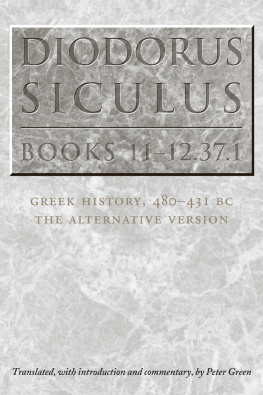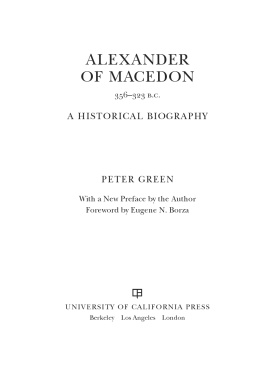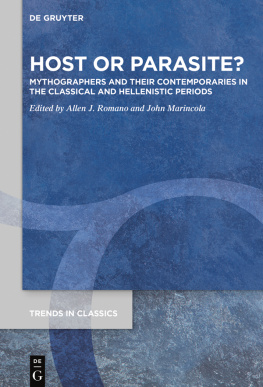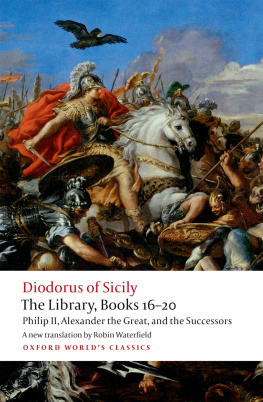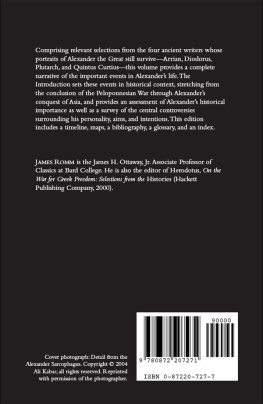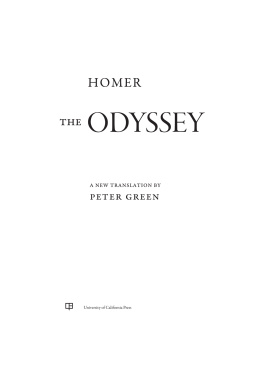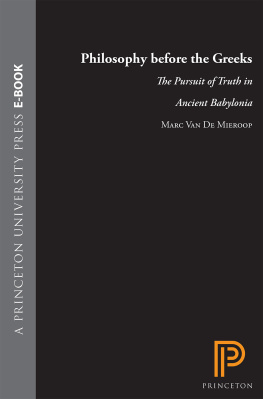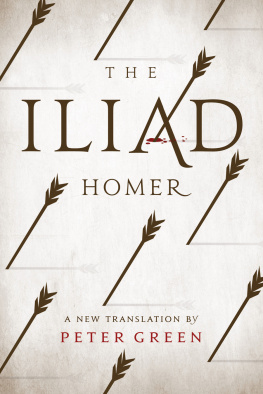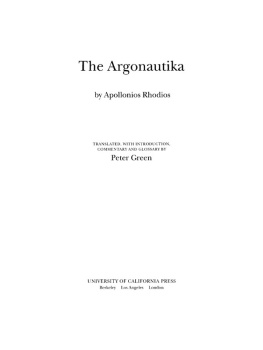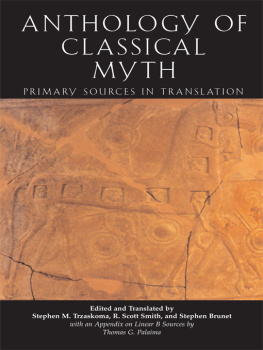Peter Green - Diodorus Siculus, Books 11-12.37.1
Here you can read online Peter Green - Diodorus Siculus, Books 11-12.37.1 full text of the book (entire story) in english for free. Download pdf and epub, get meaning, cover and reviews about this ebook. year: 2006, publisher: University of Texas Press, genre: Romance novel. Description of the work, (preface) as well as reviews are available. Best literature library LitArk.com created for fans of good reading and offers a wide selection of genres:
Romance novel
Science fiction
Adventure
Detective
Science
History
Home and family
Prose
Art
Politics
Computer
Non-fiction
Religion
Business
Children
Humor
Choose a favorite category and find really read worthwhile books. Enjoy immersion in the world of imagination, feel the emotions of the characters or learn something new for yourself, make an fascinating discovery.
- Book:Diodorus Siculus, Books 11-12.37.1
- Author:
- Publisher:University of Texas Press
- Genre:
- Year:2006
- Rating:4 / 5
- Favourites:Add to favourites
- Your mark:
- 80
- 1
- 2
- 3
- 4
- 5
Diodorus Siculus, Books 11-12.37.1: summary, description and annotation
We offer to read an annotation, description, summary or preface (depends on what the author of the book "Diodorus Siculus, Books 11-12.37.1" wrote himself). If you haven't found the necessary information about the book — write in the comments, we will try to find it.
A new English translation of Diodorus history of the Greek world during the Periclean era, and an iconoclastic reappraisal of this undervalued historian by one of the worlds leading Classicists.
Diodorus Siculus, Books 11-12.37.1 — read online for free the complete book (whole text) full work
Below is the text of the book, divided by pages. System saving the place of the last page read, allows you to conveniently read the book "Diodorus Siculus, Books 11-12.37.1" online for free, without having to search again every time where you left off. Put a bookmark, and you can go to the page where you finished reading at any time.
Font size:
Interval:
Bookmark:
DIODORUS SICULUS, BOOKS 1112.37.1
Greek History 480431 B.C. the Alternative Version
Translated, with Introduction and Commentary, by Peter Green

UNIVERSITY OF TEXAS PRESS
AUSTIN
This book has been supported by an endowment dedicated to classics and the ancient world and funded by the Aret Foundation; the Gladys Krieble Delmas Foundation; the Dougherty Foundation; the James R. Dougherty, Jr. Foundation; the Rachael and Ben Vaughan Foundation; and the National Endowment for the Humanities. The endowment has also benefited from gifts by Mark and Jo Ann Finley, Lucy Shoe Meritt, the late Anne Byrd Nalle, and other individual donors.
Copyright 2006 by Peter Green
All rights reserved
First edition, 2006
Requests for permission to reproduce material from this work should be sent to Permissions, University of Texas Press, P.O. Box 7819, Austin, TX 78713-7819. http://utpress.utexas.edu/index.php/rp-form
Library of Congress Cataloging-in-Publication Data
Diodorus, Siculus.
Diodorus Siculus, books 1112.37.1 : Greek history 480431 B.C ., the alternative version / Diodorus, Siculus; translated, with introduction and commentary by Peter Green.
p. cm.
Includes bibliographical references and index.
ISBN 0-292-70604-9 (hardcover : alk. paper)
ISBN 0-292-71277-4 (pbk.: alk. paper)
1. GreeceHistoryAthenian supremacy, 479431 B.C.
I. Green, Peter, 1924 II. Title.
DF227.D56 2006
938'.04dc22
2005014976
ISBN 978-0-292-79587-7 (e-book)
ISBN 978-0-292-77907-5 (individual e-book)
To my students of the past four decades, who asked so many of the right questions
Though writing the lives of our predecessors presents difficulties to those who undertake it, the practice offers no small benefit to society at large; for by frankly delineating noble [and base] actions, it adorns the virtuous and diminishes the base, through the praise and censure appropriate to each. The praise, one might say, is a prize for virtue that costs nothing, while the censure is a punishment for vice that draws no blood. It is good for later generations to be reminded that whatever life a man chooses to live determines the way in which he will be remembered after his death, and thus to avoid the passion for setting up memorials in stone (which exist in one place only, and are liable to the sharp inroads of decay), and rather choose reason, allied with the virtues in general, which reach everywhere through word of mouth. Time, which withers all else, keeps these immortal, and indeed with increasing age renders them younger still. And clearly my words are true of such men, for though they existed long ago, they are recalled by all as though they were alive today.
D.S. IO, FR. 12
Il y a gure de mauvais tmoins. Un rcit trs imparfait peut renfermer des renseignements utiles. Un tmoignage ne forme pas un tout indivisible quil faille dclarer vridique ou faux. Pour en faire la critique, il convient de la dcomposer en ses lments, qui seront prouvs, lun aprs lautre.
MARC BLOCH
PREFACE
My acquaintance with Diodorus goes back half a century, and involves a most improbable prophecy. While writing my first published bookan excruciatingly nave account of my recent travels in Italy and SicilyI found myself getting interested in that early Sicilian nationalist Ducetius. To find out more about him, I turned to Diodorus, as anyone must who studies the ancient history of Sicily. When my book appeared it was, to my considerable surprise, picked out by Harold Nicolson as the subject of a lead review in the London Observer. This, I very soon realized, was in order to let Nicolson play with it, as cat with mouse, and exercise his cultured irony at my expense. Still, column-inches, good or bad, measure publicitysomething my publisher was quick to point outso I couldnt really complain. The acme of damning with faint praise was reached by Nicolson in his final sentence, where, magnanimously, he assured his readers that one day this neophyte author would write a commentary on Diodorus Siculus that would delight us all. Since I happened to rememberand so, Im sure, did Nicolsonthat Macaulay had described Diodorus as a stupid, credulous, prosing old ass, I wasnt convinced that this was an unalloyed compliment. But it certainly stuck in my mind. In the fullness of timeand fifty years on can surely be so describedit looks as though Nicolsons improbable forecast may, at long last, be coming true. The commentary, at least, is materializing. How many people it delights will, of course, be quite another matter.
For a great deal of my career as a professional classicist, Ilike so many of my colleagueslooked on Diodorus as a mere pis aller fallback, only as good as his source of the moment. While there is undoubtedly a certain amount of truth in this popular thumbnail evaluation, it is very far from the whole picture, as I discovered when I began to investigate him more closely, as a necessary preliminary to my projected commentary on Herodotos. What struck me first, and most powerfully, was the violent, contemptuous, and often seemingly near-hysterical academic chorus of dismissal, most pronounced among German, or Germanic-inspired, exponents of Quellenforschung. It struck me then, and still does, that any author capable of arousing such a degree of emotional vituperation in scholars has to be something more than a mere slavish copyist or mindless Dummkopf. So, indeed, it turned out. Diodorus also happens to be the only surviving continuous narrative source for Greek history between the Greco-Persian Wars and Alexanders Successors (Diadochoi): as a result, the academic world could, and did, claim to be faulting him, in effect, for not having adopted the historiographical principles of Thucydides, and for choosing instead to follow the (necessarily inferior) vulgate tradition.
Again, there is some truth in this. Again, it is not the whole truth. As my research advanced, I began to realize that much of the hysteria was due to the need to preserve traditional rules and principles that enable textual critics or historians to make easy rule-of-thumb generic judgments. Too often for comfort, Diodorus narrative disagrees with those of Herodotos or Thucydides: if these are by definition deemed superior, the awkward business of solving historical problems can be virtually shelved. A mindless scribbler (who must also, apparently, be a congenital liar) can be disregarded whenever his evidence conflicts with that of a blue-riband early source. This assumption that Diodorus variants are always wrong must, of courseas I soon saw, and as the hostile tradition was well awarebe balanced against those many occasions on which the Dummkopf says what historians want to hear. The solution, in terms of Quellenforschung, turned out to be simple: when Diodorus gets anything right, the credit goes to his (conveniently nonsurviving) source, copied more or less verbatim, and, of course, without comprehension. As a recipe for saving historians trouble, this ranks with the cognate notionalso very popular in nineteenth-century Germanyof the uncontaminated manuscript tradition.
Unfortunately (as what follows should make amply clear), Diodorus, properly examined, turns out to be a rational, methodical, if somewhat unimaginative, minor historian, who planned on a large scale, and was quite capable of seeing major faults and inconsistencies provided he lived to correct them. This means that all the historical problems in his text that have for long been side-stepped on the grounds that his evidence is that of a virtual mental defective, and thus can always be disregarded when inconvenient, are back on the table for discussion. I hope I have always been alert to this problem. I first became really aware of it during the first few months of 1999. At the time, I was living in Athens, in a rather dingy Kolonaki apartment. Contrary to popular beliefs concerning the Athens climate, it rained almost every day. Kosovo was in full spate, and almost every Athenian I talked to, including many highly cultivated and cosmopolitan old friends, was rabidly, and often scarily, pro-Serb. (I sometimes got the distinct impression that they felt a little ethnic cleansing might be no bad thing.)
Next pageFont size:
Interval:
Bookmark:
Similar books «Diodorus Siculus, Books 11-12.37.1»
Look at similar books to Diodorus Siculus, Books 11-12.37.1. We have selected literature similar in name and meaning in the hope of providing readers with more options to find new, interesting, not yet read works.
Discussion, reviews of the book Diodorus Siculus, Books 11-12.37.1 and just readers' own opinions. Leave your comments, write what you think about the work, its meaning or the main characters. Specify what exactly you liked and what you didn't like, and why you think so.

